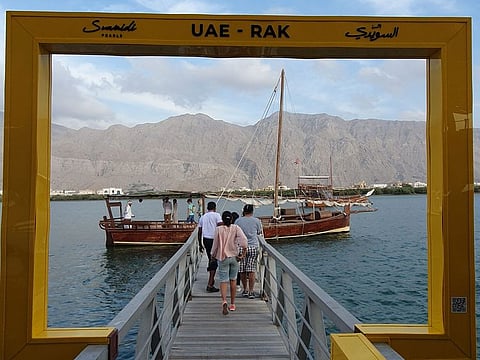Watch: Finding pearls at the Suwaidi Pearl Farm in Ras Al Khaimah
From bead to pearl, this Ras Al Khaimah farm is all about tradition and history

Cream, white, pink, yellow, black – in all of its colours and sizes, the beauty of a pearl is ethereal. The pearl has been considered a status symbol associated with purity, wealth and power for over 8,000 years of recorded history.
In Greek mythology, pearls were considered divine, believed to be teardrops of the goddess of love. Historic records suggest that in Rome, Julius Caesar – known as a connoisseur of pearls – restricted the sale and purchase of these gems by wealth and status. The world’s oldest pearl jewellery was found on the sarcophagus of a Persian princess, believed to have died in 520 BC.
The fame of pearls from this region is as old as the history of the gem. For hundreds of years, the finest natural pearls in the world were known to be sourced from the warm waters of the Arabian Gulf.
The UAE, in particular, has a special place in pearl history. The world’s oldest natural pearl – the Abu Dhabi Pearl – was discovered at a Neolithic site on Marawah Island, just off the coast of Abu Dhabi. In March, archaeologists found the oldest pearling town in the Gulf on Siniyah Island in Umm al-Quwain.
Pearls are tied to the culture of the UAE and are deeply connected to its economy and society for centuries. The pearling industry in the UAE was at its peak in the early 1900s, and nearly all adult men in the coastal towns were heading out to sea.
The cultivation of pearls started in Japan around the same time and spread around the world, hitting the pearl-diving industry hard. In 1958, oil was discovered in the UAE, and the economy did a 180 – bringing to a halt the tradition that had survived for thousands of years.
This is why a visit to the Suwaidi Pearl Farm in Ras Al Khaimah is imperative. The tour is the perfect way to get an insight into how important the industry was to Emiratis.
Owned by Abdulla Rashed Al Suwaidi, the farm is his tribute to grandfather Mohammed bin Abdulla Al Suwaidi – who was one among the last pearl-diving generations in the UAE.
We tried the Suwaidi Pearl Farm experience which begins with a scenic ride on a traditional boat. On this 15-minute boat ride, you can glimpse lush green mangroves and enjoy the sea air, surrounded by the impressive Hajar mountain range.
Perfect for families and children, the boat also has snacks, coffee and juices on board. The boat stops near a floating deck with seating and a walkway with other boats anchored nearby. Wood panels surrounding the deck feature posters, old pictures and information about the history of pearl diving in the UAE.
The pearling season was from June to September (Ghous Al Kabir or The Big Dive), our guide explained. He said the crew would stay at sea for as long as four months on boats of varying sizes. The dive was risky and hard work, with just one in 10,000 chances of getting a good gem.
The divers would use stones to weight their bodies down as they jumped in, and the rest of the crew would pull them up once done. The crew also had to be wary of pirates, predatory fish, and marine life, such as sharks or jellyfish.
The equipment used by the divers – baskets, ropes, leather gloves, knives, nose clips made of wood or turtle bones – were intuitive and highly functional given the resources they had at the time.
At the farm, the guide showed us a wooden chest similar to the one every diving boat would have. The chest was where the captain of the crew would store the collected gems. It also contained special sieve-like dishes that would help determine the worth of the pearl. The weight, size, colour and lustre of the pearl defined its price.
The guide also showed us agate rocks used to measure the weight of the pearl.
Next up, the guide opens up small red pouches, each containing different types and sizes of pearls - the most valuable being a collection of natural pearls. Visitors are not allowed to touch these.
The highlight of the experience was seeing a one-of-a-kind pearl rosary or ‘Tabeeh’ with 33 cultured Arabian pearls from the farm. It is one of only three that exist in the world. The pearls used for the rosary took four to five years to cultivate and collect.
The pearl farming process increases the odds of finding a pearl to 60 per cent, up from just 0.01 per cent in pearl diving. Farming involves placing a bead inside the oyster to ‘irritate’ it. The oyster secretes aragonite and conchiolin in response to the irritant, which forms a material called ‘mother-of-pearl’ or nacre.
Layers of this material surround the irritant, forming the pearl.
The Suwaidi Pearl Farm uses small beads made of the same mother-of-pearl material to start the process. Cultured Arabian saltwater pearls, like the ones cultivated on the farm, are in high demand today.
The farm opened in 2004 is the first of its kind in the region, and in 2017, the destination opened up to visitors as a tourist attraction. Along with the guided boat ride and tour, the destination offers visitors stand-up paddle boarding and a full-day tour with Abdullah himself.
The farm tour is great for families and is suitable for all ages. For visitors who book in advance, the team will also set up lunch at the floating deck. The tour starts at Dh250 per person while children can go on the tour for Dh125. Infants, senior citizens and people of determination get discounted tickets.
Sign up for the Daily Briefing
Get the latest news and updates straight to your inbox
